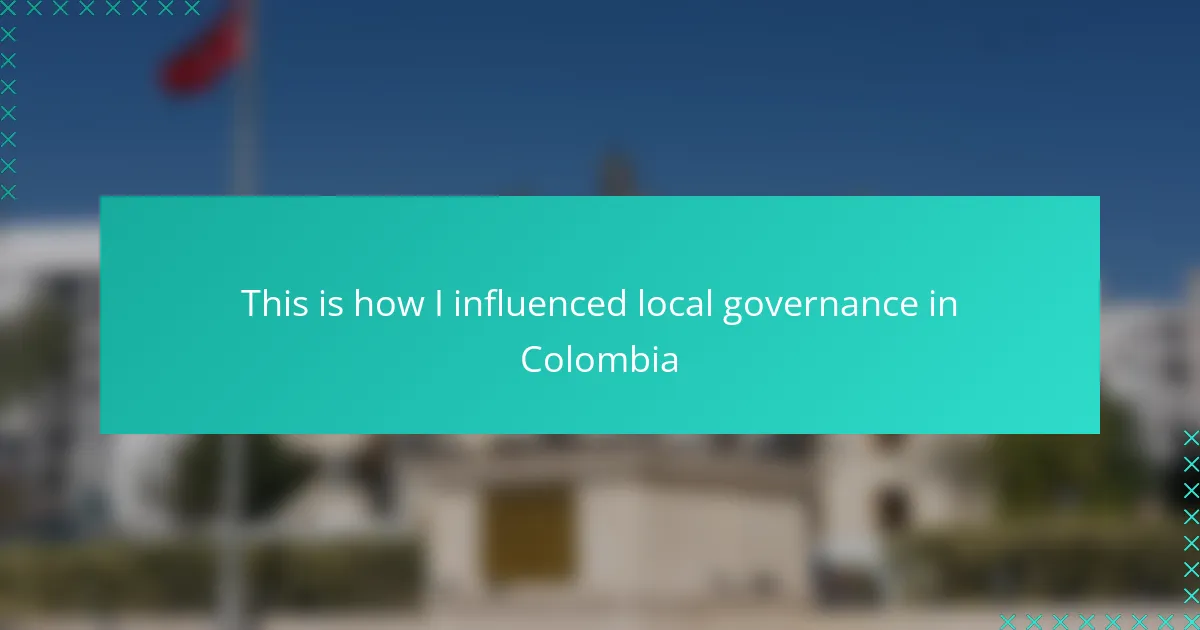Key takeaways
- Effective local governance in Colombia relies on transparency, accountability, and inclusive community participation to build trust and responsiveness.
- Community engagement fosters collaboration and innovation, transforming skepticism into shared purpose and ongoing dialogue.
- Building alliances with local leaders and using data-driven storytelling are vital strategies for influencing policy changes.
- Overcoming challenges in governance requires patience, persistence, and flexibility, as effective relationships take time to cultivate.
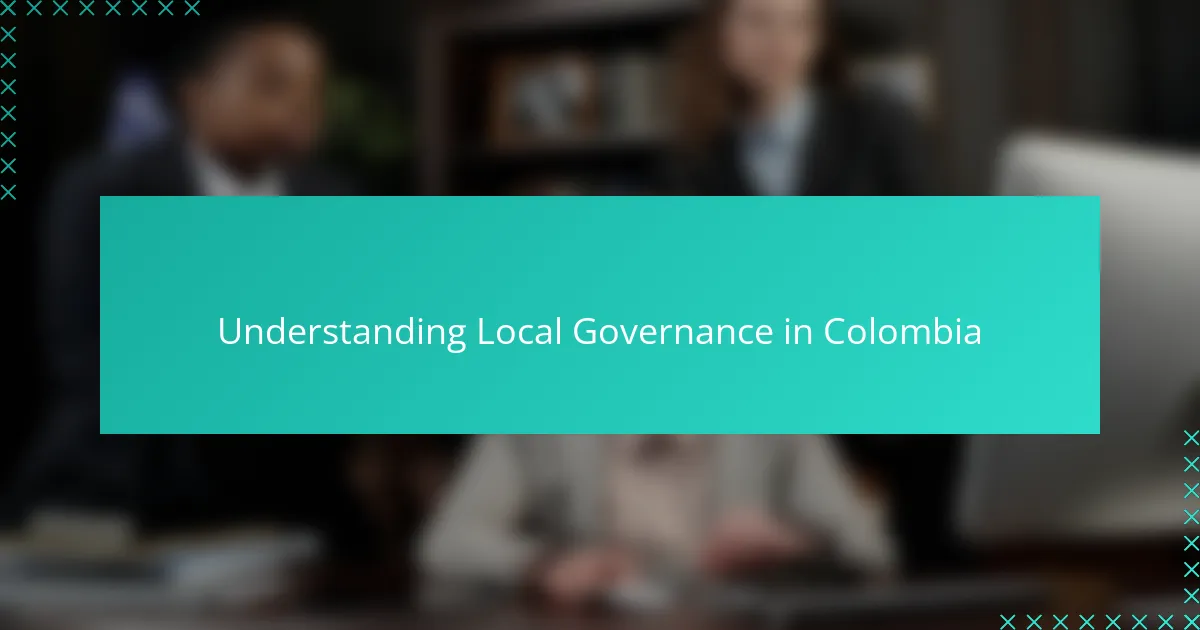
Understanding Local Governance in Colombia
Local governance in Colombia operates within a framework shaped by its diverse regions and complex history. From my experience, understanding how municipal and departmental authorities interact with communities is key to grasping the power dynamics at play. Have you ever wondered how decisions at the local level can directly impact people’s daily lives, often more than national policies?
In Colombia, local governments hold responsibilities ranging from public services to security coordination, but their effectiveness varies widely depending on resources and political will. I recall witnessing firsthand how a well-organized local council could transform a neglected neighborhood by prioritizing transparent decision-making and citizen participation. This taught me that local governance is not just bureaucracy; it’s a living system shaped by relationships and trust.
What struck me most was the resilience and creativity of local actors navigating both formal institutions and informal networks. Understanding this blend is crucial if you want to influence governance or simply appreciate how grassroots democracy functions in Colombia. It made me realize that behind every policy, there’s a story of negotiation, compromise, and often, persistence against great odds.
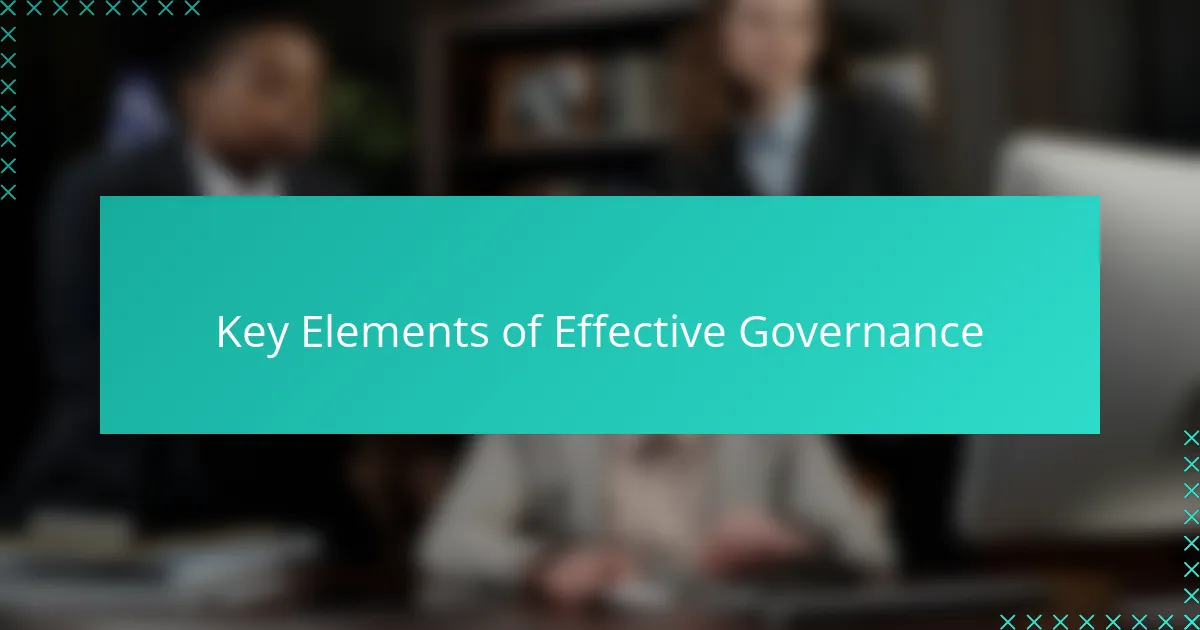
Key Elements of Effective Governance
Effective governance, in my experience, hinges first and foremost on transparency. When people see how decisions are made and resources allocated, trust begins to bloom. I remember attending community meetings where openness shifted skepticism into active participation—it was a powerful reminder that clarity fuels legitimacy.
Accountability is another cornerstone I’ve come to value deeply. Without mechanisms that hold leaders responsible, promises dissolve into air. Hasn’t it happened to you that a lack of follow-through breeds frustration? In a Colombian town I worked with, establishing clear accountability channels transformed the political climate, making officials more responsive and residents more optimistic.
Lastly, inclusive participation shapes governance that truly reflects the community’s needs. I’ve seen how inviting diverse voices—not just the loudest or most powerful—can change the trajectory of local projects. It makes me ask: how often do we genuinely listen before acting? Encouraging collective input doesn’t just improve policies; it builds ownership and resilience in governance structures.
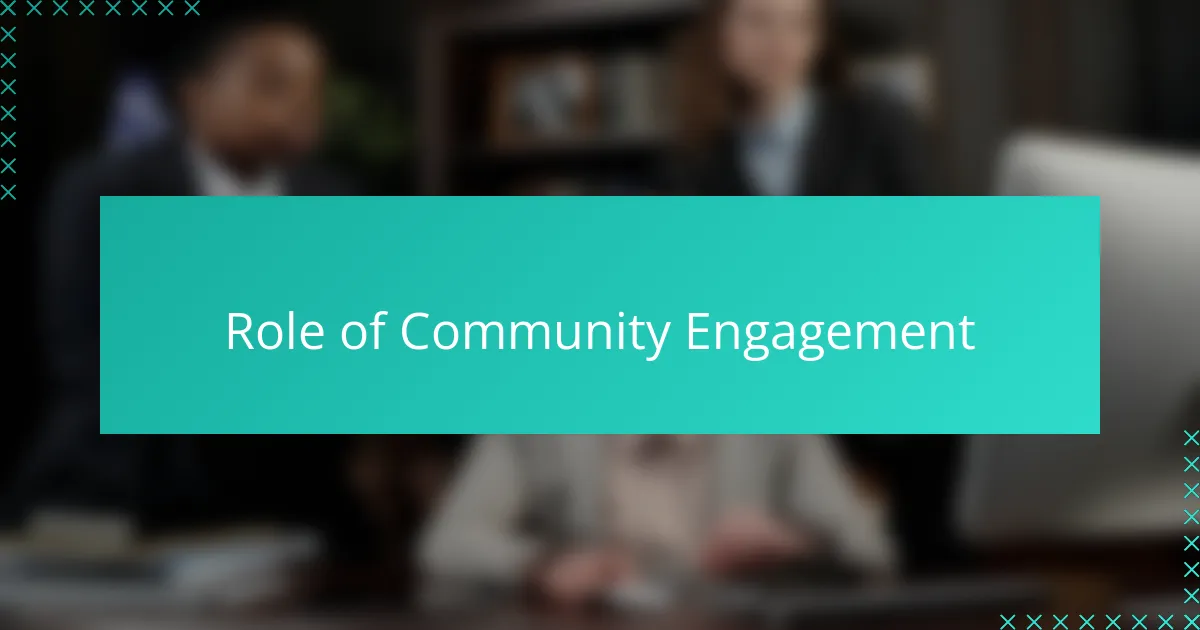
Role of Community Engagement
Community engagement became the heartbeat of my efforts to influence local governance in Colombia. I recall one particular town hall meeting where listening closely to residents’ stories revealed not just problems, but also potential solutions rooted in their daily realities. This made me realize how crucial it is to create spaces where people feel heard and empowered to contribute.
Have you ever noticed how simply gathering a diverse group of citizens can spark unexpected ideas? That’s exactly what happened when I facilitated workshops bringing together youth, elders, and local officials. The energy shifted from skepticism to collaboration, proving to me that community engagement is more than participation—it’s about building shared purpose.
More than once, I saw that engagement isn’t a one-time event but a continuous dialogue. Sustaining this connection requires patience and genuine respect for local voices, even when progress feels slow. From my experience, it’s this persistent relationship-building that truly shapes responsive and inclusive governance.
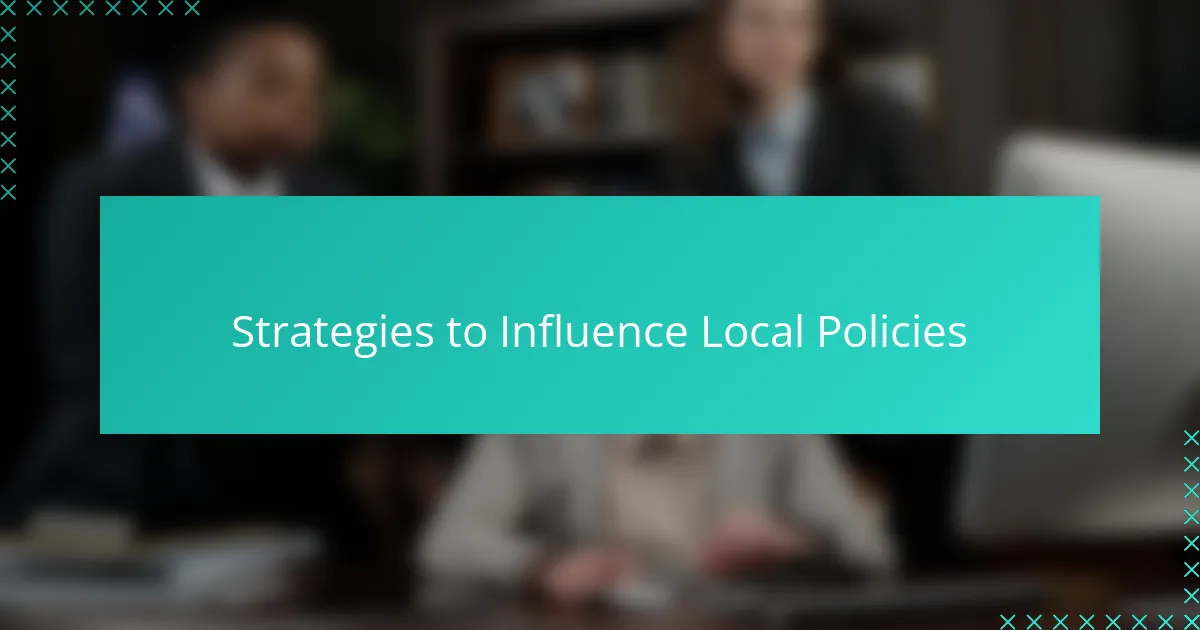
Strategies to Influence Local Policies
One strategy that I found particularly effective was building alliances with local leaders who genuinely cared about their communities. By aligning my goals with theirs, it became easier to navigate bureaucratic hurdles and push for policies that addressed real needs. Have you ever considered how much easier change is when you’re not working alone but alongside passionate partners?
Another approach I relied on was using data and storytelling to make a compelling case for policy changes. In one instance, presenting clear evidence combined with personal testimonies from affected residents turned abstract issues into urgent matters officials couldn’t ignore. This blend of facts and human experience proved powerful in shifting perspectives and motivating action.
Lastly, persistence and adaptability were my constant companions. Local governance is often slow and unpredictable, so I learned to stay patient while tweaking strategies in response to setbacks. Have you noticed that sometimes the key to influencing policy isn’t a grand gesture but steady, small steps that build momentum over time? From what I saw, those incremental gains eventually led to meaningful outcomes.
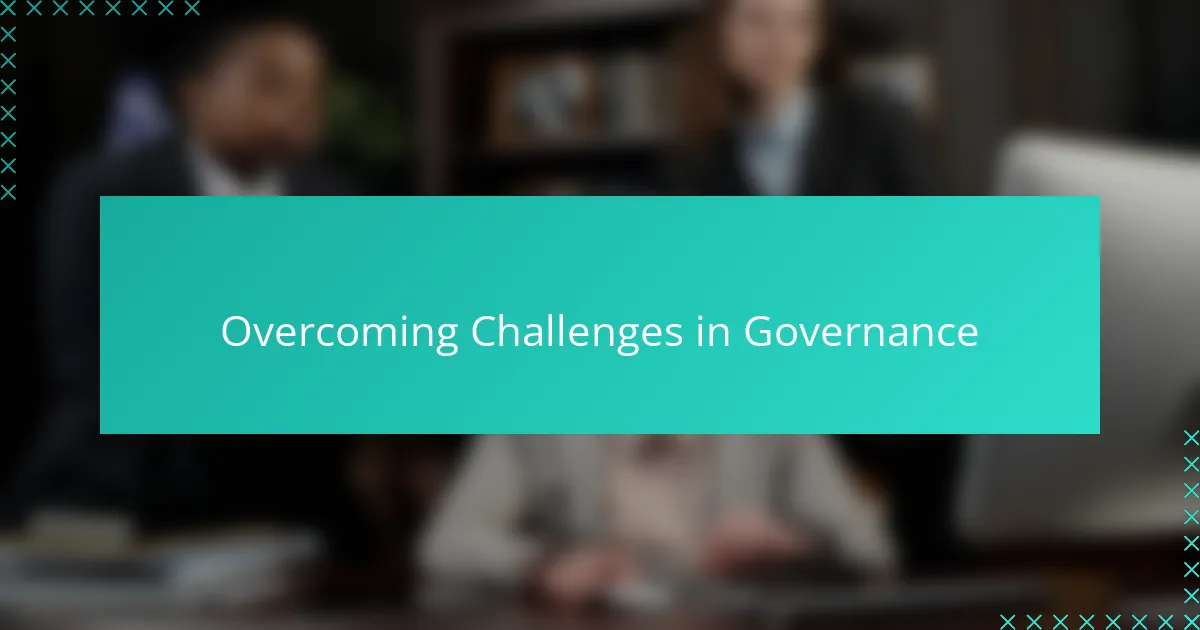
Overcoming Challenges in Governance
Challenges in local governance can feel like facing an uphill battle, especially when resources are scarce and bureaucratic inertia slows progress. I remember moments when frustration crept in, yet it was the willingness to listen patiently and keep pushing that made all the difference. Have you ever experienced that mix of discouragement and hope when trying to get a community’s voice heard?
Dealing with entrenched interests and political resistance requires more than just good ideas; it demands building trust and demonstrating persistence. In one case, I saw how a small, consistent effort to engage skeptical officials gradually opened doors that seemed firmly shut at first. This taught me that overcoming challenges isn’t about quick wins but about cultivating relationships that endure.
Sometimes, the most daunting obstacles lay hidden in the complexities of governance systems themselves. Navigating these required creative problem-solving and a readiness to adapt plans without losing sight of the bigger goal. From my perspective, embracing flexibility while holding on to core values was key to breaking through barriers that initially seemed insurmountable.
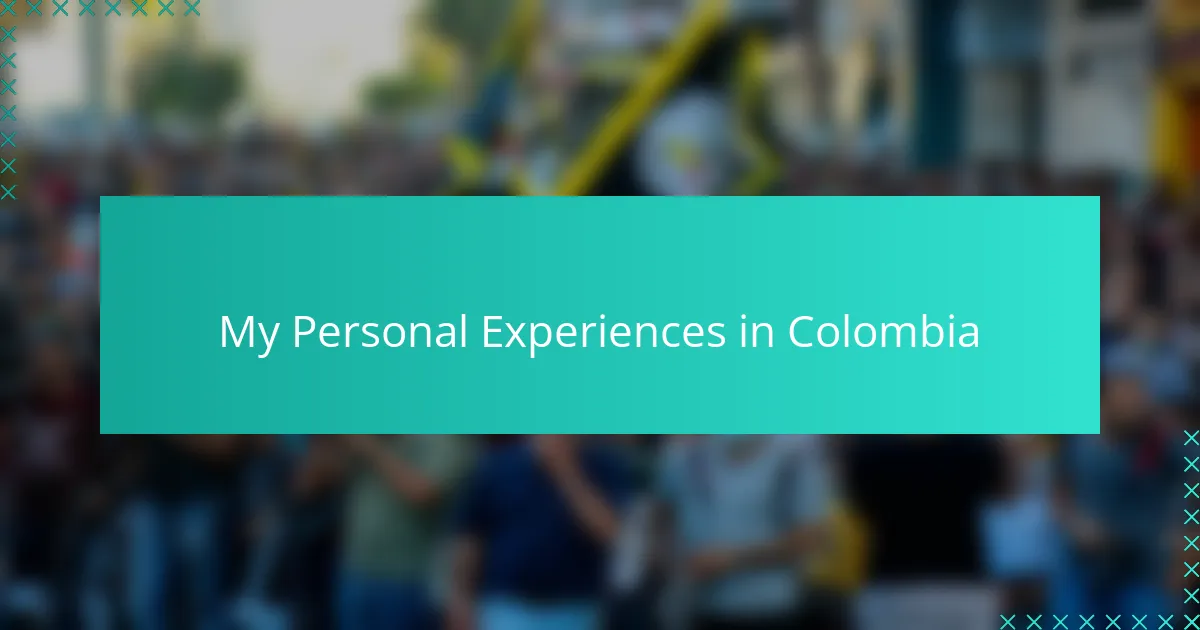
My Personal Experiences in Colombia
Spending time in Colombia, I quickly realized that local governance isn’t just about policies—it’s about people. I remember walking through a small town where the mayor took the time to introduce me to residents, listening attentively to their concerns. Doesn’t that kind of personal connection make all the difference in building trust and understanding how decisions affect everyday lives?
One experience that stayed with me was attending a community workshop where skepticism hung in the air at first. But as voices began to be heard—from young activists to seasoned elders—the atmosphere shifted. I found myself inspired by how genuine dialogue could transform doubt into a collective drive for change. Have you ever seen a group go from silence to shared purpose in just a few hours?
Of course, not everything was smooth. There were moments when progress felt painfully slow, and I questioned if my efforts truly mattered. Yet, hearing a single community member express gratitude for even small improvements reminded me why persistence matters. Sometimes, it’s the quiet victories that fuel the ongoing journey toward better governance.
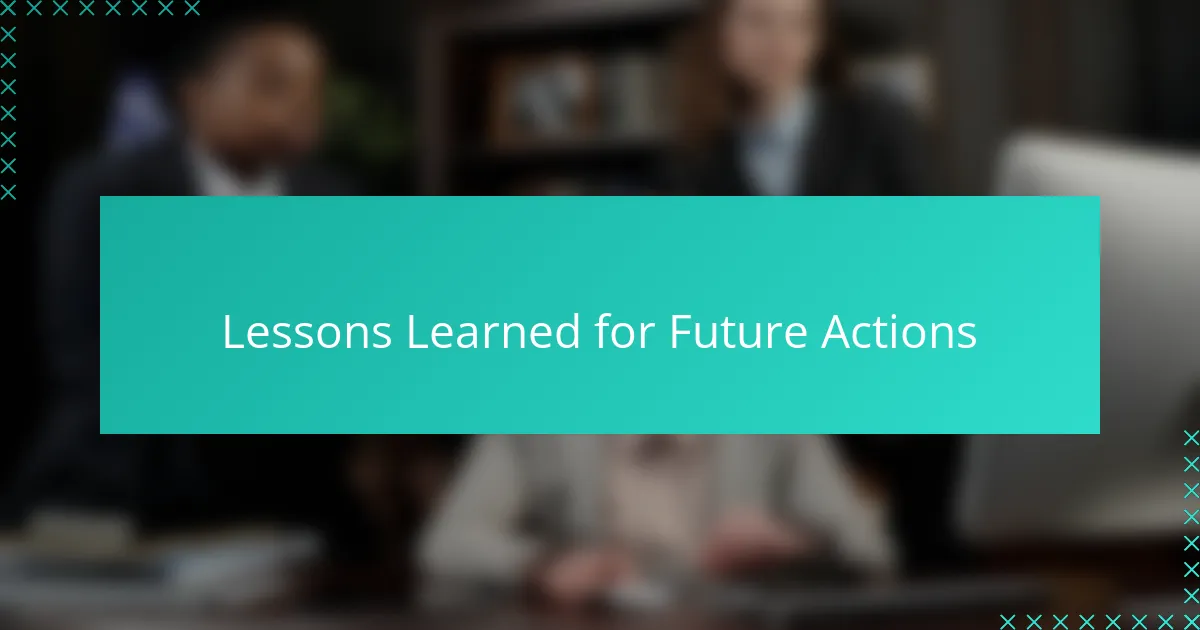
Lessons Learned for Future Actions
One lesson I’ve come to value deeply is the importance of patience in local governance. Have you ever felt frustrated waiting for change that seems to crawl at a snail’s pace? From my experience in Colombia, meaningful progress often emerges from steady, persistent efforts rather than quick fixes.
I also learned that flexibility is crucial. When one approach hits a wall, it’s tempting to give up, but adapting strategies while holding onto core goals makes all the difference. For instance, facing resistance from certain officials taught me to listen carefully and find alternative pathways to build consensus.
Finally, I realized that building authentic relationships requires continuous commitment. Trust isn’t granted once and forever; it’s nurtured over time through consistent engagement and respect. How often do we underestimate the power of simply being present and genuinely invested in community concerns? This, more than anything else, shapes the future of effective local governance.
